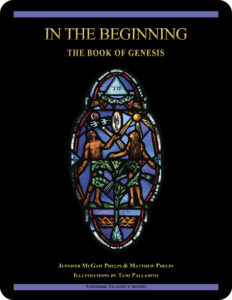 In the Beginning:
In the Beginning:
The Book of Genesis
Lesson 24 Joseph Interprets Dreams
the book of Genesis 40:1—41:57
Revised Standard Version Catholic Edition (RSVCE)*
New American Bible Revised Edition (NABRE)*
Catechism of the Catholic Church
Rosarium Virginis Mariae (Rosary of the Virgin Mary)
ex libris (in our library)
cross references in the book of Genesis
next lesson: Joseph’s Brothers Travel to Egypt
This material coordinates with Lesson 24 on pages 129–134 in the study book In the Beginning: The Book of Genesis.
“And God saw everything that he had made, and behold, it was very good. And there was evening and there was morning, a sixth day. Thus the heavens and the earth were finished, and all the host of them. And on the seventh day God finished his work which he had done, and he rested on the seventh day from all his work which he had done.”—the book of Genesis 1:31—2:2
welcome to our in-depth study of the book of Genesis
We invite interested groups and individuals to check out the sample first lesson from this 28-lesson  Turning to God’s Word Catholic Bible study.
Turning to God’s Word Catholic Bible study.  These online study pages link to our free lesson video overviews as well as to a list of cross references in the biblical text. Other study aids include maps, charts, illustrations, additional commentary, and prayers based on the primary Scripture in each lesson. In the Beginning: The Book of Genesis has been granted an imprimatur and can be purchased from our website shop. If you have a Bible-study question or comment, click on one of the “ask us your question” or “what do you think” buttons on any online study page.
These online study pages link to our free lesson video overviews as well as to a list of cross references in the biblical text. Other study aids include maps, charts, illustrations, additional commentary, and prayers based on the primary Scripture in each lesson. In the Beginning: The Book of Genesis has been granted an imprimatur and can be purchased from our website shop. If you have a Bible-study question or comment, click on one of the “ask us your question” or “what do you think” buttons on any online study page.
open with prayer
It’s always wise to begin any Bible study with prayer, whether reading the Scriptures alone or meeting with others in a discussion study group. You can pray using your own words or use one of the opening prayers on our website. We especially like the following:
Lord Jesus, you promised to send your Holy Spirit
to teach us all things.
As we read and study your word today,
allow it to touch our hearts and change our lives. Amen.
let’s review—the book of Genesis 38:1—39:23
Lesson 23 Judah & Tamar; Joseph & Potiphar’s Wife recounts two racy stories, the first of which focuses on the lineage of Judah. The emphasis on this section in the book of Genesis is on Joseph; the author’s inclusion of the story of Judah and Tamar establishes the genealogical background for the line of Judah into which Jesus eventually will be born. The story that recounts Joseph’s resistance to the advances of Potiphar’s wife emphasizes his righteous behavior. While Joseph has done well managing Potiphar’s household, his refusal to make a moral compromise sends him to prison. The biblical text explains that even in prison, the LORD is watching over Joseph and guiding the course of his life. As a result, the care of the other prisoners mostly is left to Joseph.
Joseph comes into his own
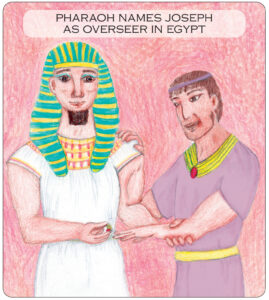 This illustration by Turning to God’s Word co-founder Tami Palladino depicts Pharaoh giving Joseph authority over all of Egypt. God’s intervention in Joseph’s life now is becoming obvious, but it probably wasn’t so obvious during Joseph’s hardships. It’s significant that Joseph rises to a role of great prominence in Egypt through his ability to successfully interpret a pair of dreams that have been troubling Pharaoh. Joseph rightly credits his interpretation to God, but it’s worth noting that Joseph doesn’t hesitate to take personal advantage of his meeting with Pharaoh to improve his own situation. Click on the illustration (right) to enlarge it. The original illustration is on page 133 in the study book In the Beginning: The Book of Genesis.
This illustration by Turning to God’s Word co-founder Tami Palladino depicts Pharaoh giving Joseph authority over all of Egypt. God’s intervention in Joseph’s life now is becoming obvious, but it probably wasn’t so obvious during Joseph’s hardships. It’s significant that Joseph rises to a role of great prominence in Egypt through his ability to successfully interpret a pair of dreams that have been troubling Pharaoh. Joseph rightly credits his interpretation to God, but it’s worth noting that Joseph doesn’t hesitate to take personal advantage of his meeting with Pharaoh to improve his own situation. Click on the illustration (right) to enlarge it. The original illustration is on page 133 in the study book In the Beginning: The Book of Genesis.
 what’s behind Joseph’s ability to interpret dreams accurately? (17:53)
what’s behind Joseph’s ability to interpret dreams accurately? (17:53)
In the video for Lesson 24, “Joseph Interprets Dreams,” Turning to God’s Word  author Matthew Phelps discusses the notion that the entire family of Jacob appears to be able to interpret the meaning of dreams, and Joseph displays a matter-of-fact approach to his own ability in this regard. When Joseph meets a couple of prisoners who have dreams they don’t understand, he has no problem interpreting them, and he explains the reason why: The interpretation of dreams belongs to God. Since Joseph is confident about his relationship with God, he’s equally confident that he can interpret the
author Matthew Phelps discusses the notion that the entire family of Jacob appears to be able to interpret the meaning of dreams, and Joseph displays a matter-of-fact approach to his own ability in this regard. When Joseph meets a couple of prisoners who have dreams they don’t understand, he has no problem interpreting them, and he explains the reason why: The interpretation of dreams belongs to God. Since Joseph is confident about his relationship with God, he’s equally confident that he can interpret the  unusual dreams of Pharaoh’s baker and butler. All Joseph asks is that when the butler is restored to Pharaoh’s service, he remember Joseph. The videos for this study are being redone and will be posted as they become available. The original videos for Lessons 4 through 28 will remain accessible until then.
unusual dreams of Pharaoh’s baker and butler. All Joseph asks is that when the butler is restored to Pharaoh’s service, he remember Joseph. The videos for this study are being redone and will be posted as they become available. The original videos for Lessons 4 through 28 will remain accessible until then.
The Scripture ranges for the videos being redone to accompany this Catholic Bible study from Turning to God’s Word will match the Scripture ranges for the sets of questions in the study book In the Beginning: The Book of Genesis. Viewers will be able to follow along as author Matthew Phelps discusses Lesson 24, “Joseph Interprets Dreams,” on pages 129–134 in the study book.
country-club incarceration
The exact situation at the prison where Joseph is being held is unclear. While no imprisonment can be pleasant, some prison environments are more pleasant than others. The book of Genesis 39:21–23 suggested the possibility that Joseph may have been put into what we’d consider a comparatively cushy incarceration. Former servants of Pharaoh are held in the same prison, and Joseph is given the task of caring for them. This seems to include inquiring after them when they appear downcast and troubled. Since one naturally would expect being confined to prison to be troubling enough, the fact that the biblical text treats the idea of Pharaoh’s former servants being troubled as unusual, strongly suggests that those in this particular prison ordinarily aren’t exposed to extremely trying circumstances.
a theme of rebirth
The book of Genesis 40:20 discloses that the butler and baker are sent to Pharaoh on the third day after Joseph interprets their dreams, and that day also happens to be Pharaoh’s birthday. This hints at a rebirth theme related to Jesus dying and then rising to new life on the third day. In this section in the book of Genesis, the rebirth will be Joseph’s when he ultimately rises to political power. This doesn’t happen immediately, however. Instead, it’s the butler who’s restored to his former life while the baker is consigned to death—just as Joseph predicts. The timing of life and death remains up to God.
ex libris—two books about spiritual direction
Two of the best books we’ve recently come across that discuss the practical ins and outs of 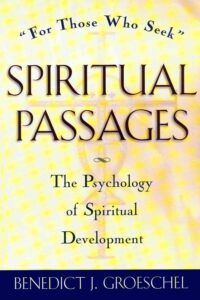
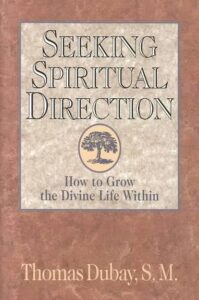 discernment are Spiritual Passages by Benedict Groeschel, C.F.R., and Seeking Spiritual Direction by Thomas Dubay, S.M.
discernment are Spiritual Passages by Benedict Groeschel, C.F.R., and Seeking Spiritual Direction by Thomas Dubay, S.M.  Both authors have written other excellent books as well, but people interested in learning more about spiritual direction may find these two titles particularly insightful. At ex libris—main bookshelf, you can read excerpts from both of these books by Catholic priests, and you also can learn more about other works related to Catholic Bible study.
Both authors have written other excellent books as well, but people interested in learning more about spiritual direction may find these two titles particularly insightful. At ex libris—main bookshelf, you can read excerpts from both of these books by Catholic priests, and you also can learn more about other works related to Catholic Bible study.
WHAT DO YOU THINK about all of this emphasis on dreams?
The heavy emphasis on dreams in the story of Joseph points to the idea that God can speak to us through our dreams. This is by no means true of every dream.
? Read the Gospel According to Matthew 2:1–12. What is unusual about the information recorded about the dream of the wise men?
 ? Consider how the wise men were able to determine that their dream was significant enough to be taken seriously.
? Consider how the wise men were able to determine that their dream was significant enough to be taken seriously.
? How does the dream of the wise men differ from the dream of Jesus’ earthly father Joseph that’s recorded in the Gospel According to Matthew 2:13?
? What safeguards are in place in your life to prevent you from misinterpreting a dream?
? How would you go about determining whether a dream you had was a message from God?
? Have you ever been disturbed by a dream?
? Have you ever had a shared experience of the same dream?
? Consider why Joseph is so careful to credit God with dream interpretation.
 behold—you could look it up in our archives
behold—you could look it up in our archives
The word “behold” appears a number of times in the forty-first chapter in the book of Genesis. To learn how this word points to the importance of details in Pharaoh’s dreams, read Lost in Translation, an online column in which Turning to God’s Word author Matthew Phelps helps readers connect with ideas expressed in the original languages of the Scriptures. New Lost in Translation entries are posted on Mondays, and past entries are archived on our website. Contact us if you’d like to receive Lost in Translation by email every week.
t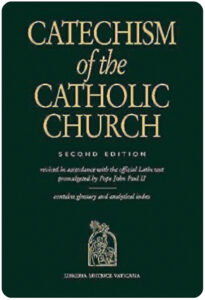 he best Catholic commentary about Scripture
he best Catholic commentary about Scripture
To find out more about how Church teaching is supported by Scripture passages in In the Beginning: The Book of Genesis, check out the Index of Citations in the Catechism of the Catholic Church. Links (Revised Standard Version Catholic Edition [RSVCE*]) to the primary Scripture passages in the lesson and relevant paragraphs in the Catechism are provided here. Not every passage in the biblical text for this Catholic study is referenced in a Catechism paragraph, however.
the book of Genesis 41:42—paragraph 1295
to learn more, read more Scripture
If you’re having difficulty with a particular passage of Scripture, it can be helpful to read the relevant  cross references—but looking these up can take time. To make that easier, we’ve compiled the cross references from the Revised Standard Version Second Catholic Edition (RSV2CE)—the translation that we reprint in our study books. That list can be found at the top of every online study page, and it includes links to cross references in the primary biblical text for In the Beginning: The Book of Genesis.
cross references—but looking these up can take time. To make that easier, we’ve compiled the cross references from the Revised Standard Version Second Catholic Edition (RSV2CE)—the translation that we reprint in our study books. That list can be found at the top of every online study page, and it includes links to cross references in the primary biblical text for In the Beginning: The Book of Genesis.
don’t forget about our indexes & extra online material

 If you’re trying to locate information about a specific Scripture passage, you can look it up in the index at the back of the study book or sample lesson. If you want to find a particular commentary, you can look up its title in the topics index. To learn more about another book of the Bible for which there’s a Turning to God’s Word study, visit the online study directories to read the commentaries and watch any accompanying videos. Finally, if you have a question or would like to make a comment about any of our studies, you can use one of the “ask us your question” or “what do you think” buttons to email our authors.
If you’re trying to locate information about a specific Scripture passage, you can look it up in the index at the back of the study book or sample lesson. If you want to find a particular commentary, you can look up its title in the topics index. To learn more about another book of the Bible for which there’s a Turning to God’s Word study, visit the online study directories to read the commentaries and watch any accompanying videos. Finally, if you have a question or would like to make a comment about any of our studies, you can use one of the “ask us your question” or “what do you think” buttons to email our authors.
ex libris—Church documents & books about religious topics
Link to magisterial documents referred to in our Bible studies at ex libris—magisterial documents.  This listing includes significant recent encyclicals as well as a number of historical Church documents. Recommended books related to Scripture study can be found at ex libris—main bookshelf.
This listing includes significant recent encyclicals as well as a number of historical Church documents. Recommended books related to Scripture study can be found at ex libris—main bookshelf.
wondering how to pronounce some of these words?
The following link is to a reading from the New International Version (NIV) Bible. To listen, open the link and click on the audio icon above the printed text. Although not taken from the translations used in our study materials, the NIV reading provides an audio guide to pronunciation of words in this lesson’s primary biblical text. A close online version of the translation of the Bible used in Catholic liturgy in the United States as well as an audio guide for daily Mass readings for the current month can be found on the website of the United States Conference of Catholic Bishops (USCCB).
the book of Genesis 40:1—41:57 (NIV)
 close with Bible-based prayer related to this lesson
close with Bible-based prayer related to this lesson
Many of our Catholic study groups like to conclude their discussions with a prayer based on the scriptural focus of their lesson, and some participants include Scripture-specific prayer in their individual study. If you’re uncomfortable composing your own Bible-based prayers, you can follow our four easy steps. If you prefer, you can use the following prayer based on this lesson’s text from the book of Genesis.
O God, you always are at work to bring about good in the world.
Foster in us a spirit of gratitude and the desire
to look for evidence of your presence
in all areas of our lives.
We ask this in the name of Jesus Christ, who was present
with you and the Spirit at Creation. Amen.
Lesson 25 Joseph’s Brothers Travel to Egypt—the book of Genesis 42:1—43:34
Lesson 23 Judah & Tamar; Joseph & Potiphar’s Wife—the book of Genesis 38:1–39:23
you also may like our study of Scripture & the Rosary (digital only)
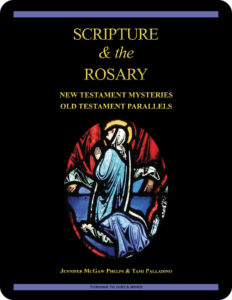 Scripture & the Rosary: New Testament Mysteries, Old Testament Parallels, a 26-lesson Catholic Bible study with an imprimatur, looks at the biblical foundations of the Rosary. The study includes lessons on Pope St. John Paul II’s Rosarium Virginis Mariae (Rosary of the Virgin Mary), the Apostles’ Creed, and the Luminous Mysteries as well as the original 15 Mysteries of the Rosary. Color photographs of stained glass windows depict key scenes in the lives of Jesus and Mary. Free digital lessons rotate throughout the year on our website.
Scripture & the Rosary: New Testament Mysteries, Old Testament Parallels, a 26-lesson Catholic Bible study with an imprimatur, looks at the biblical foundations of the Rosary. The study includes lessons on Pope St. John Paul II’s Rosarium Virginis Mariae (Rosary of the Virgin Mary), the Apostles’ Creed, and the Luminous Mysteries as well as the original 15 Mysteries of the Rosary. Color photographs of stained glass windows depict key scenes in the lives of Jesus and Mary. Free digital lessons rotate throughout the year on our website.
start a Turning to God’s Word Bible study
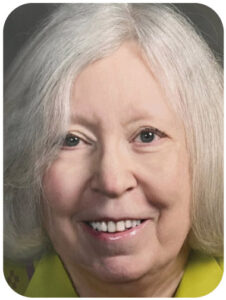 Thank you for your interest in our study In the Beginning: The Book of Genesis.
Thank you for your interest in our study In the Beginning: The Book of Genesis.  Information about beginning a Turning to God’s Word Catholic Bible study can be found at start a Bible study. Tami, Matthew, and I are available to answer questions and offer support. Contact us if you’d like to start a Turning to God’s Word study or have your schedule listed with other TtGW study groups on our website. —Jennifer
Information about beginning a Turning to God’s Word Catholic Bible study can be found at start a Bible study. Tami, Matthew, and I are available to answer questions and offer support. Contact us if you’d like to start a Turning to God’s Word study or have your schedule listed with other TtGW study groups on our website. —Jennifer
*There are seven deuterocanonical books in the Old Testament—the Books of Tobit, Judith, Wisdom, Sirach, Baruch, and First and Second Maccabees, as well as some passages in the Books of Esther and Daniel. Protestants usually refer to these works as “apocryphal,” a word that means “outside the (Protestant) canon” because they’re excluded from most Protestant Bibles. The word “deuterocanonical” means “second canon”; Catholics use that word to refer to any section of the Catholic Old Testament for which there are no extant, or existing, Hebrew manuscripts. All of the deuterocanonical books appear in the Septuagint, the earliest remaining versions of which date to the 1st century B.C. This Greek translation of the Old Testament was in common use by Jews at the time of Jesus—but the same books aren’t found in existing Hebrew manuscripts, which aren’t as old as the oldest version of the Septuagint. Learn more by reading How Do Catholic & Protestant Bibles Differ?
Turning to God’s Word printed Bible studies use the 2006 Revised Standard Version Second Catholic Edition (RSV2CE) translation for all Scripture references except those to the Psalms, which are taken from The Abbey Psalms and Canticles, prepared by the Benedictine monks of Conception Abbey and published in 2020 by the United States Conference of Catholic Bishops (USCCB). All Scripture links for the online study pages for In the Beginning: The Book of Genesis are to the 1966 Revised Standard Version Catholic Edition (RSVCE) translation. The New International Version (NIV) audio recordings follow the same chapter and verse numbering as the RSV Catholic translations, but the NIV translation doesn’t include the deuterocanonical books and passages.
The 1966 RSVCE uses archaic pronouns and verb forms such as “thee,” “thou,” “didst” in the Psalms and in direct quotations attributed to God. The 2006 RSV2CE replaces those with more accessible English. The few significant translation changes in the RSV2CE include rendering almah as “virgin” in the Book of Isaiah 7:14 and restoring the term “begotten” in the Gospel According to John 3:16.
Numbering varies for some passages in this Bible study. Turning to God’s Word studies (print and digital) follow the numbering in the Revised Standard Version Catholic translations (RSV2CE and RSVCE). Discrepancies in the New American Bible Revised Edition (NABRE) are noted in the Index of Scripture Citations in the study book and the online sample.
 You can learn more about the Psalms by viewing a sample lesson from the Turning to God’s Word Catholic Bible study Sing a New Psalm: Communicating with God Through the Prayers of the Church—Volume I: Lauds & Vespers. The second part of that study, Sing a New Psalm: Communicating with God Through the Prayers of the Church—Volume II: Vigils, Day Prayer & Compline, is scheduled for publication in 2025. Some verse numbers may vary in different translations of the Psalms.
You can learn more about the Psalms by viewing a sample lesson from the Turning to God’s Word Catholic Bible study Sing a New Psalm: Communicating with God Through the Prayers of the Church—Volume I: Lauds & Vespers. The second part of that study, Sing a New Psalm: Communicating with God Through the Prayers of the Church—Volume II: Vigils, Day Prayer & Compline, is scheduled for publication in 2025. Some verse numbers may vary in different translations of the Psalms.
